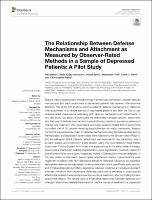Please use this identifier to cite or link to this item:
https://hdl.handle.net/20.500.12202/9328| Title: | The relationship between defense mechanisms and attachment as measured by observer-rated methods in a sample of depressed patients: A pilot study |
| Authors: | Békés, Vera Aafjes-van Doorn, Katie Spina, Daniel Talia, Alessandro Starrs, Claire J. Perry, J. Christopher 0000-0003-2584-5897 |
| Keywords: | defense mechanism adult attachment depressed patients Patient Attachment Coding System Non-depressive defenses Defense Mechanisms Rating Scales Depressive immature defenses |
| Issue Date: | 27-Sep-2021 |
| Publisher: | Frontiers Media S.A. |
| Citation: | Békés, V., Aafjes-Van Doorn, K., Spina, D., Talia, A., Starrs, C. J., & Perry, J. C. (2021). The relationship between defense mechanisms and attachment as measured by observer-rated methods in a sample of depressed patients: A pilot study Frontiers in Psychology, 12. https://www.frontiersin.org/article/10.3389/fpsyg.2021.648503 |
| Series/Report no.: | Frontiers in Psychology; |
| Abstract: | Despite many theoretical and clinical writings, the theorized connection between defense mechanisms and adult attachment in depressed patients has received little empirical attention. This is the first study to examine patients’ defense mechanisms in relation to their attachment in a clinical sample of depressed patients and also the first to use observer-rated measures for assessing both defense mechanisms and attachment. In this pilot study, we aimed to investigate the relationship between patients’ attachment and their use of defense mechanisms in psychotherapy sessions, as well as patterns of change over treatment. We conducted a secondary analysis of data from a randomized controlled trial of 30 patients receiving psychotherapy for major depression. Session transcripts were previously coded for defense mechanisms using the Defense Mechanisms Rating Scales, and depression severity data were collected by the clinician-rated HRSD-17 and the self-report BDI-II. Patients’ attachment was assessed in two transcripts, one in an early session and a second in a late session, using the novel observer-rated Patient Attachment Coding System. In contrast with expectations, in the early phase of therapy, preoccupied attachment-related characteristics were significantly positively related to overall defensive functioning and negatively related to Depressive immature defenses. In the late phase of treatment, preoccupied attachment-related characteristics were negatively correlated with Non-depressive immature defenses. Moreover, as expected, early-phase defense use was related to late phase attachment; specifically, early neurotic and immature Depressive and Non-depressive defenses predicted an increase in avoidant, whereas immature Non-depressive defenses predicted a decrease in preoccupied attachment-related characteristics over the course of treatment, after controlling for early attachment effects. The results imply a longitudinal relationship between defenses and change in attachment-related characteristics over the course of treatment in a depressed sample and warrant further research about the relationship between defenses and attachment during psychotherapy. |
| Description: | Scholarly article / Original Research/ Peer-reviewed / Open access |
| URI: | https://www.frontiersin.org/articles/10.3389/fpsyg.2021.648503/full https://hdl.handle.net/20.500.12202/9328 |
| ISSN: | 1664-1078 |
| Appears in Collections: | Ferkauf Graduate School of Psychology: Faculty Publications |
Files in This Item:
| File | Description | Size | Format | |
|---|---|---|---|---|
| Aafjes-Van Doorn The relationship 2021 fpsyg-12-648503.pdf | 479.77 kB | Adobe PDF |  View/Open |
This item is licensed under a Creative Commons License

